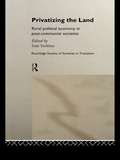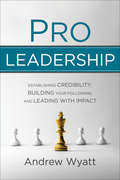- Table View
- List View
Privatization in Latin America: Myths and Reality
by Alberto Chong Florencio Lopez de SilanesPrivatization is under attack. Beginning in the 1980s, thousands of failing state-owned enterprises worldwide have been turned over to the private sector. But public opinion has turned against privatization. A large political backlash has been brewing for some time, infused by accusations of corruption, abuse of market power, and neglect of the poor. What is the real record of privatization and are the criticisms justified? 'Privatization in Latin America' evaluates the empirical evidence on privatization in a region that has witnessed an extensive decline in the state's share of production over the past 20 years. The book is a compilation of recent studies that provide a comprehensive analysis of the record of and accusations against privatization, with important recommendations for the future.Seven countries are investigated: Argentina, Bolivia, Brazil, Chile, Colombia, Mexico, and Peru. This book will be vital to anyone interested in the privatization debate but especially to those involved in civil service reform, corporate governance, economic policy, finance, and anticorruption efforts. 'Privatization is important but controversial. While economists typically favor it, others are skeptical. This book provides strong scientific evidence that privatization has been beneficial for many Latin American countries, although some privatizations failed and some groups in society lost out. As usual, the devil is in the details: how privatization is carried out and what reforms accompany it are crucial to its success. The book is definitely an invaluable contribution to the privatization debate.' --Oliver Hart, Andrew E. Furer Professor of Economics, Harvard University
Privatization in Malaysia: Regulation, Rent-Seeking and Policy Failure (Routledge Malaysian Studies Series)
by Jeff TanIn recent years, privatisation has fallen out of favour in many countries because the underlying political factors have not been well understood. This book examines Malaysia’s privatisation programme, focusing on how political constraints resulted in the failure of four major privatisations: the national sewerage company (IWK), Kuala Lumpur Light Rail Transit (LRT), national airline (MAS), and national car company (Proton). It considers why developing countries such as Malaysia might want to embark on privatisation, the factors that lead to policy failure, and what is needed to make it work. It shows clearly that political motives driving privatisation often dominate purely economic considerations, and thus it is necessary to analyse privatisation within the specific country context. It argues that failure in the Malaysian case was due to political considerations that compromised institutional design and regulatory enforcement, leading to problems associated with corruption. It concludes that privatisation does not necessarily improve incentives for efficiency or enhance the finance available for capital investment, and that successful privatisation depends on the state’s institutional and political capacity to design and manage an appropriate set of subsidies. Overall, this book is a comprehensive examination of privatisation in Malaysia, providing important insights for understanding the political economy of this process in other developing countries.
Privatization in Transition Countries
by Donal Mcgettigan Oleh HavrylyshynThe authors' view is that any privatisation is better than none, regardless of whether a stable, competitive environment has been established first. However, private companies started from scratch perform best, followed by newly privatised firms run by outsiders, either local or foreign. Privatised companies dominated by insiders do less well, but even they regularly outperform state enterprises. Without an appropriate market environment though, managers may spend more time lobbying the government for support than undertaking painful restructuring measures.
Privatization in the European Union: Theory and Policy Perspectives
by David ParkerThe book identifies different national characteristics in terms of the motivation to privatise, the scale of privatization and its consequences. In the opening chapters there is a detailed overview of the theoretical economic issues involved in privatisation and an assessment of privatization across the EU. The remaining ten chapters contain national case studies of EU countries which review the history of state ownership and privatization in each of these countries and evaluate the extent of privatisation. The role of European Commission directives in deregulating markets and stimulating privatisation is also examined.
Privatization of Anatolia National Telekom: General Instructions for All Simulation Participants
by Michael D. Watkins Paul Vaaler Burkhard Schrage Banu OzcanAnatolia National Telekom is a multiparty negotiation simulation patterned after the Turkish government's aborted attempt to privatize its state-owned telecommunications monopoly, Turk Telekom, in late 1997. Provides participants with an opportunity to identify and negotiate complex issues related to the valuation and sale of a state-owned enterprise in an emerging market. Members of each negotiating team are valuing a 20% equity stake being offered by three "selling" teams to three prospective "buying" teams representing different types of foreign investors.
Privatization of Public City Gas Utilities (Kobe University Monograph Series in Social Science Research)
by Shinichi Kusanagi Takashi YanagawaThis book is a study on the Japanese city gas industry, which has been rapidly liberalized in recent years. Especially, it focuses on the background, reasons, methods, and effects of the privatization of publicly owned city gas utilities in Japan. In Japan, after the Great East Japan Earthquake, the liberalization of the electric power and gas business has progressed rapidly. There are a number of studies on the reform of Japan's electricity market, but there are few studies on city gas business. This book describes the state of Japan's public city gas utilities and the necessity of their privatization. And it explains the role of concession as a method of privatization. Then it verifies that the effects of past privatization cases are insufficient. The book also covers deregulation of public utilities in Europe, which triggered Japan's liberalization of its energy and other public utility sectors, and privatization of electricity and gas businesses in India, a developing country in Asia. Finally, this book explores future regulation and business of city gas industry. Pipeline network should be regulated to comply with future unbundling starting from 2022, and gas business altogether with electricity and water businesses need more digitization.
Privatization of Public Services: Impacts for Employment, Working Conditions, and Service Quality in Europe (Routledge Studies in Employment and Work Relations in Context)
by Jörg Flecker Christoph HermannPublic services throughout Europe have undergone dramatic restructuring processes in recent years in connection with liberalization and privatization. While evaluations of the successes of public services have focused on prices and efficiency, much less attention has been paid to the impacts of liberalization and privatization on employment, labor relations, and working conditions. This book addresses this gap by illustrating the ways in which liberalization has contributed to increasing private and foreign ownership of public services, the decentralization of labor relations has amplified pressure on wages, and decreasing employment numbers and increasing workloads have improved productivity partly at the cost of service quality. Examining diverse public-service sectors including network industries, public transportation, and hospitals, and using international case studies, Privatization of Public Services covers a wide range of aspects of service provision, with particular emphasis on companies and workers. The result is a unique picture of the changes created by the liberalization processes in Europe.
Privatization of Rhone-Poulenc--1993
by Peter Tufano Donald S. CollatIn mid-1993, representatives of Rhone-Poulenc, a leading nationalized French firm, worked with the French government to plan the imminent privatization of the firm. One aspect of the privatization was to create incentives for employees to buy and hold shares in the firm. A partial privatization earlier in 1993 proved that workers were reluctant to hold equities, even after receiving discounts and subsidized financing. The key financial officers of the firm received a proposal from Bankers Trust that would offer employees a unique investment in the firm, which might increase employee participation in the share offering. This alternative would guarantee employees a minimum rate of return yet allow them to enjoy appreciation of the firm's shares. The financial officers have to decide whether to propose this employee stock ownership alternative to the French government and to Rhone-Poulenc's board for inclusion in the forthcoming privatization.
Privatization of the Power Sector in Nigeria (A)
by Eric Werker Olatomiwa Igun Alice Wei Onyechi EzekwuecheIn spite of its abundant energy resources, Nigeria in 2012 had one of the lowest levels of energy use in the world. Self-generation of power from costly generators was double that of grid-supplied electricity. The history of its power sector was one of inefficient monopolies, missteps, and corruption. But a wholesale change to the market, designed under reformist President Obasanjo and pushed forward by President Jonathan, promised greater efficiencies and investment guided by private-sector principles including widespread privatization, pricing reforms, and reliance on firms to produce and distribute the electricity. Power producer firms on the sideline needed to decide whether they wanted to be a part of this new market.
Privatization of the Power Sector in Nigeria (B)
by Eric Werker Olatomiwa Igun Alice Wei Onyechi EzekwuecheSupplement for case 713042
Privatization, Regulation and Deregulation
by Michael BeesleyIn this second edition of Privatization, Regulation and Deregulation, the author has updated and augmented the original material to take account of developments over the last 5 years. This volume includes ten completely new chapters and coverage of the critical period from 1981to the present. The book provides a unique insight into the privatization and regulatory procedure. In addition, it presents a significant contribution to the basic economic arguments underlying these reforms to practitioners involved in privatization and regulation.
Privatization, Vulnerability, and Social Responsibility: A Comparative Perspective (Gender in Law, Culture, and Society)
by Martha Albertson Fineman Ulrika Andersson Titti MattssonTaking a cross-cultural perspective, this book explores how privatization and globalization impact contemporary feminist and social justice approaches to public responsibility. Feminist legal theorists have long problematized divisions between the private and the political, an issue with growing importance in a time when the welfare state is under threat in many parts of the world and private markets and corporations transcend national boundaries. <p><P> Because vulnerability analysis emphasizes our interdependency within social institutions and the need for public responsibility for our shared vulnerability, it can highlight how neoliberal policies commodify human necessities, channeling unprofitable social relationships, such as caretaking, away from public responsibility and into the individual private family. This book uses comparative analyses to examine how these dynamics manifest across different legal cultures. By highlighting similarities and differences in legal responses to vulnerability, this book provides important insights and arguments against the privatization of social need and for a more responsive state.
Privatização no Paquistão: desafios e resposta
by Shahid Hussain Raja Gisely GanozaEste pequeno EBook é uma versão expandida do meu artigo "Privatização no Paquistão", que eu escrevi logo depois da minha aposentadoria como Secretário Federal do Governo do Paquistão, Ministério da Privatização em 2012. Sua publicação atraiu muita atenção, me pedindo que escrevesse um documento completo, um livro sobre a história da privatização no Paquistão e outras questões relacionadas, incluindo suas perspectivas e os desafios que enfrentará em curto e médio prazo. Desprovido de termos técnicos e escrito em um idioma fácil de ler, este pequeno livro é para leitores em geral, particularmente para aqueles que precisam saber o que está acontecendo com os esforços de privatização do Paquistão depois de entrar no poder um regime favorável às empresas, a Liga Muçulmana do Paquistão, em 2013.
Privatizing China: Inside China's Stock Markets
by Fraser J. HowiePRIVATIZING CHINA INSIDE CHINA'S STOCK MARKETS In more depth than any other, this highly readable book lays bare why China's capital markets have fallen so far short of their promise. It is required reading for anyone seeking to understand the realities and the future of an extraordinary economic transformation. - James Kynge, Former Beijing Bureau Chief, Financial Times, Author, China Shakes the World Carl Walter and Fraser Howie bring together a wealth of experience to this complex and deeply important topic. Their book contains a mine of invaluable quantitative and qualitative information as well as an incredible depth of knowledge. It is essential reading for anyone investing in companies from mainland China. - Professor Peter Nolan, Judge Institute of Management Studies, University of Cambridge Privatizing China is essential for anyone who wants to understand China's companies and stock markets. no one should invest in China without reading it. - Arthur Kroeber, Managing Editor, China Economic Quarterly Carl Walter and Fraser Howie combine a deep knowledge of China and finance to provide an unflinching perspective on the country's effort to build functioning capital markets. China may have wowed the world with its high-speed economic growth and manufacturing prowess, but this book is compelling evidence that Beijing's mastery of the universe does not yet extend to the stock market. - Richard MacGregor, beijing Correspodent, FinancialTimes This book will answer many people's questions regarding SOEs and the stock market. I think it is destined to become the standard reference work on the subject. - Jean C. Oi, Director, Center for East Asian Studies, Stanford University
Privatizing China: Socialism from Afar
by Aihwa Ong Li ZhangEveryday life in China is increasingly shaped by a novel mix of neoliberal and socialist elements, of individual choices and state objectives. This combination of self-determination and socialism from afar has incited profound changes in the ways individuals think and act in different spheres of society. Covering a vast range of daily life--from homeowner organizations and the users of Internet cafes to self-directed professionals and informed consumers--the essays in Privatizing China create a compelling picture of the burgeoning awareness of self-governing within the postsocialist context. The introduction by Aihwa Ong and Li Zhang presents assemblage as a concept for studying China as a unique postsocialist society created through interactions with global forms. The authors conduct their ethnographic fieldwork in a spectrum of domains--family, community, real estate, business, taxation, politics, labor, health, professions, religion, and consumption--that are infiltrated by new techniques of the self and yet also regulated by broader socialist norms. Privatizing China gives readers a grounded, fine-grained intimacy with the variety and complexity of everyday conduct in China's turbulent transformation.
Privatizing Peace: How Commerce Can Reduce Conflict in Space
by Wendy N. Whitman CobbThis book explores the privatization of space and its global impact on the future of commerce, peace and conflict. As space becomes more congested, contested, and competitive in the government and the private arenas, the talk around space research moves past NASA’s monopoly on academic and cultural imaginations to discuss how Elon Musk’s SpaceX and Jeff Bezos’ Blue Origin is making space "cool" again. This volume addresses the new rhetoric of space race and weaponization, with a focus on how the costs of potential conflict in space would discourage open conflict and enable global cooperation. It highlights the increasing dependence of the global economy on space research, its democratization, plunging costs of access, and growing economic potential of space-based assets. Thoughtful, nuanced, well-documented, this book is a must read for scholars and researchers of science and technology studies, space studies, political studies, sociology, environmental studies, and political economy. It will also be of much interest to policymakers, bureaucrats, think tanks, as well as the interested general reader looking for fresh perspectives on the future of space.
Privatizing Poland: Baby Food, Big Business and the Remaking of Labor
by Elizabeth C. DunnThis book examines the effects privatization has on workers' self-concepts; how changes in "person-hood" relate to economic and political transitions; and how globalization and foreign capital investment affect Eastern Europe's integration into the world economy.
Privatizing Poland: Baby Food, Big Business, and the Remaking of Labor
by Elizabeth C. DunnThe transition from socialism in Eastern Europe is not an isolated event, but part of a larger shift in world capitalism: the transition from Fordism to flexible (or neoliberal) capitalism. Using a blend of ethnography and economic geography, Elizabeth C. Dunn shows how management technologies like niche marketing, accounting, audit, and standardization make up flexible capitalism's unique form of labor discipline. This new form of management constitutes some workers as self-auditing, self-regulating actors who are disembedded from a social context while defining others as too entwined in social relations and unable to self-manage. Privatizing Poland examines the effects privatization has on workers' self-concepts; how changes in "personhood" relate to economic and political transitions; and how globalization and foreign capital investment affect Eastern Europe's integration into the world economy. Dunn investigates these topics through a study of workers and changing management techniques at the Alima-Gerber factory in Rzeszów, Poland, formerly a state-owned enterprise, which was privatized by the Gerber Products Company of Fremont, Michigan. Alima-Gerber instituted rigid quality control, job evaluation, and training methods, and developed sophisticated distribution techniques. The core principle underlying these goals and strategies, the author finds, is the belief that in order to produce goods for a capitalist market, workers for a capitalist enterprise must also be produced. Working side-by-side with Alima-Gerber employees, Dunn saw firsthand how the new techniques attempted to change not only the organization of production, but also the workers' identities. Her seamless, engaging narrative shows how the employees resisted, redefined, and negotiated work processes for themselves.
Privatizing the Democratic Peace
by Henry F. CareyNGOs have become one of the main instruments in building peace, especially as UN sanctioned peacekeeping missions begin to streamline or are tranformed into formal peacebuilding missions, and as bilateral consensual or unilaterally imposed peacekeeping, like the US in Iraq and Russia in Georgia, endure for decades. During the past three decades, the UN has relied more and more on NGOs and sub-contractors in peacebuilding. The greater the number of multi-dimensional challenges and dilemmas that emerge for these NGOs, the more the sponsoring governments and intergovernmental organizations and host states are directly affected by these transitional efforts. Henry F. Carey analyzes the difficult choices, consequences and lessons learned from the UN and foreign governments commissioning NGOs and other subcontractors working on six peacebuilding policy goals: reconciliation, security, human rights, the rule of law, foreign aid, and election monitoring. The study examines the effects of the UN and powerful states increasingly relying on NGO peacebuilding in diverse cases like Bosnia, El Salvador, Nicaragua, Haiti, Liberia, Rwanda, Sierra Leone, Sudan, the Philippines, Chechnya, Iraq, Pakistan, and Afghanistan.
Privatizing the Land: Rural Political Economy in Post-Communist and Socialist Societies (Routledge Studies of Societies in Transition)
by Iván SzelényiPrivatizing the Land provides an overview of reforms in the state socialist agrarian systems, especially during the 1970s and 1980s in Eastern Europe and the Soviet Union. Using empirical evidence, the contributors provide a balanced assessment of how agrarian economies performed in different communist countries.The Soviet and Eastern European experience is contrasted with reforms in China, Vietnam and Cuba to provide the first comprehensive account of agricultural restructuring after the collapse of communism in Europe and Asia.
Privatizing the Polity
by Holona LeAnne OchsResearch on poverty and research on governance currently exist as largely disparate literatures without a framework for building knowledge regarding how policies and practices compare as poverty alleviation strategies. In Privatizing the Polity, Holona LeAnne Ochs examines the evolution of the governance of welfare programs across the United States. Throughout the political spectrum the trend in recent decades has been towards welfare privatization, shifting the boundaries of poverty governance from public to private actors—whether they are foundations or social entrepreneurs—whose interests in poverty governance are more obscure. The analysis of more than eighteen years of data suggests that strategies of devolution and privatization make it more difficult for people to move out of poverty. At the same time the framework for understanding the governance structures, enactment practices, and social wealth leverage presented in Privatizing the Polity offers numerous opportunities for acquiring a deeper understanding of assumptions formerly taken for granted and redirecting the system to enhance poverty alleviation.
Privileged Goods: Commoditization and Its Impact on Environment and Society
by Jack P. MannoWhat are the obstacles in the way of effectively solving the environmental crises of our time? What can we do to overcome them? These may be two of the most important questions heading into the 21st century. Organized human societies have the ability to completely change the world. While we have excelled at building, destroying and rebuilding, we h
Pro Leadership: Establishing Credibility, Building Your Following, and Leading with Impact
by Andrew WyattA top coach shares twenty-four principles of leadership drawn from his experience founding and running his company—and shows you how to “go pro.”Each of the chapters in Pro Leadership focuses on a pro leadership principle required to be mastered if a leader desires to “go pro”—taken from the yellow legal pad Andrew Wyatt kept in the center drawer of his desk during the twenty-four-year history following the founding of his company. Each time he learned a lesson, he would write it on the legal pad.Many books have been written on leadership. Andrew has read many, and believes aspiring leaders would benefit from doing the same—after all, leaders are readers. Pro Leadership is meant to add to this already valuable library, with three goals: To offer a fresh perspective on the vital role of leaders To help readers change the way they think about leadership To inspire, to equip, and to encourage leaders to “go pro”Pro Leadership benefits from something that can’t be bought: the wisdom of experience, both good and bad, gained over a long and rewarding career. Now leaders of the present and the future can embark on their own journey with the guidance of the founder of Andrew Wyatt Leadership LLC.
Pro Oracle Identity and Access Management Suite
by Kenneth RameyThis book presents a process-based approach to implementing Oracle's Identity and Access Management Suite. Learn everything from basic installation through to advanced topics such as leveraging Oracle Virtual Directory and Identity Federation. Also covered is integrating with applications such as Oracle E-Business Suite and WebCenter Content. Pro Oracle Identity and Access Management Suite provides real world implementation examples that make up a valuable resource as you plan and implement the product stack in your own environment. The book and the examples are also useful post-installation as your enterprise begins to explore the capabilities that Identity Management Suite provides. Implementing an identity management system can be a daunting project. There are many aspects that must be considered to ensure the highest availability and high integration value to the enterprise business units. Pro Oracle Identity and Access Management Suite imparts the information needed to leverage Oracle's Identity and Access Management suite and provide the level of service your organization demands. Show results to leadership by learning from example how to integrate cross-domain authentication using identity federation, how to allow user self-service capabilities across multiple directories with Virtual Directory, and how to perform the many other functions provided by Oracle Identity and Access Management Suite. Presents an example-based installation and configuration of the entire Oracle Identity and Access Management Suite, including high-availability and performance-tuning concepts. Demonstrates Identity Federation, Virtual Directory, Fusion Middleware Integration, and Integration with Oracle Access Manager. Introduces concepts such as Split Profiles for Identity Manager, MultiFactor authentication with Oracle Adaptive Access Manager, and Self Service Portals.
Pro SharePoint 2013 Business Intelligence Solutions
by Sahil Malik Steve Wright Srini Sistla Manpreet Singh Sha Kanjoor AnandanTo get ahead in today's hyper-competitive marketplace, your business has to take advantage of the data you already have and mine that data to give you new insight, metrics, and clues to what drives successful customer interactions. In Pro SharePoint 2013 Business Intelligence Solutions, you'll learn exactly how to unlock that magic, build business intelligence facilities on SharePoint, and glean insights from data to propel your business to the next level. To understand the various business intelligence offerings in SharePoint 2013, you need to understand the core SQL Server business intelligence concepts, and the first part of the book presents a comprehensive tutorial on those fundamentals. Pro SharePoint 2013 Business Intelligence Solutions then focuses on specific SharePoint business intelligence investments including: Visio Services Excel Services SQL Server Reporting Services Business Connectivity Services Power View and PerformancePoint Services Authors Manpreet Singh, Sha Anandan, Sahil Malik, and Steve Wright walk you through all of this material comprehensively in practical, hands-on format, with plenty of examples to empower you to use these products in your real-life projects. As compelling as SharePoint and SQL Server business intelligence are together, the challenge always has been finding people who understand both SharePoint and SQL Server well enough to deliver such business intelligence solutions. With this book in hand, you become part of that select group. Get your copy of Pro SharePoint 2013 Business Intelligence Solutions today! What you'll learn Understand the fundamentals and framework of business intelligence. Learn how to integrate Visio Services, and discover the developer story. Practice working with the Secure Store Service. Experience authoring and publishing reports using Report Builder and how to re-purpose published reports in Reporting Services. Glean practical advice about deploying and developing for Power View and PerformancePoint Services in SharePoint 2013. Learn about the advances in Excel Services and PowerPivot, and their application within SharePoint to practical situations. Gain a deep understanding of the Business Data Services feature set in SharePoint 2013. Who this book is for Pro SharePoint 2013 Business Intelligence Solutions offers SharePoint developers an essential BI foundation experience and an introduction to SQL Server 2012 tools for business intelligence. This book will also benefit SQL Server developers and administrators who require knowledge of setting up the basic infrastructure on the SharePoint platform for business intelligence. Table of Contents Business Intelligence Basics Visio Services Reporting Services Business Connectivity Services Excel Services Power View and PerformancePoint Services




















